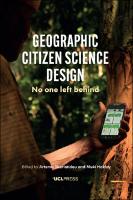Geographic Citizen Science Design
No one left behind
Contributor(s)
Skarlatidou, Artemis (editor)
Haklay, Muki (editor)
Language
EnglishAbstract
Little did Isaac Newton, Charles Darwin and other ‘gentlemen scientists’ know, when they were making their scientific discoveries, that some centuries later they would inspire a new field of scientific practice and innovation, called citizen science. The current growth and availability of citizen science projects and relevant applications to support citizen involvement is massive; every citizen has an opportunity to become a scientist and contribute to a scientific discipline, without having any professional qualifications. With geographic interfaces being the common approach to support collection, analysis and dissemination of data contributed by participants, ‘geographic citizen science’ is being approached from different angles. Geographic Citizen Science Design takes an anthropological and Human-Computer Interaction (HCI) stance to provide the theoretical and methodological foundations to support the design, development and evaluation of citizen science projects and their user-friendly applications. Through a careful selection of case studies in the urban and non-urban contexts of the Global North and South, the chapters provide insights into the design and interaction barriers, as well as on the lessons learned from the engagement of a diverse set of participants; for example, literate and non-literate people with a range of technical skills, and with different cultural backgrounds. Looking at the field through the lenses of specific case studies, the book captures the current state of the art in research and development of geographic citizen science and provides critical insight to inform technological innovation and future research in this area.
Keywords
citizen science; volunteers; data; application design; geography; human geography; anthropologyDOI
10.14324/111.9781787356122ISBN
9781787356122, 9781787356139, 9781787356146, 9781787356153, 9781787356160, 9781787356122Publisher
UCL PressPublisher website
https://www.uclpress.co.uk/Publication date and place
London, 2020Imprint
UCL PressClassification
Impact of science and technology on society
Human geography


 Download
Download